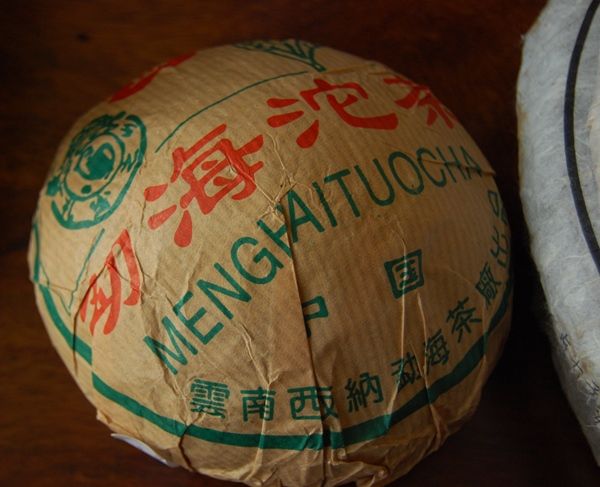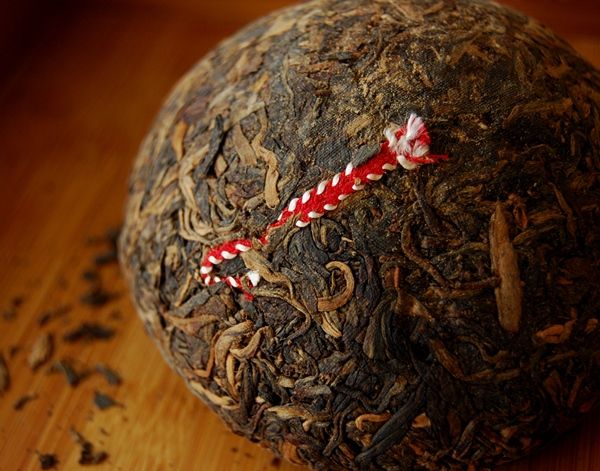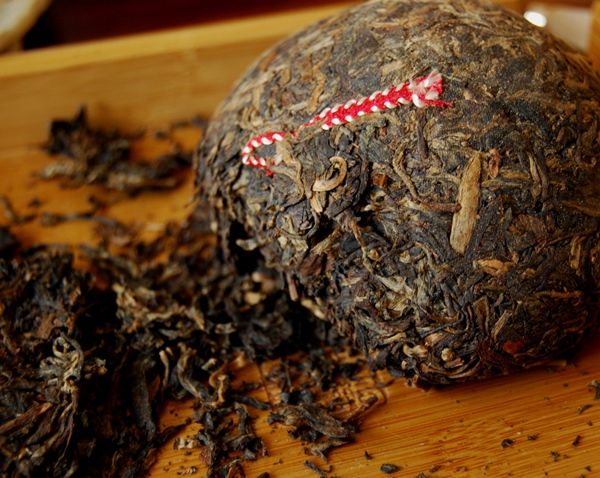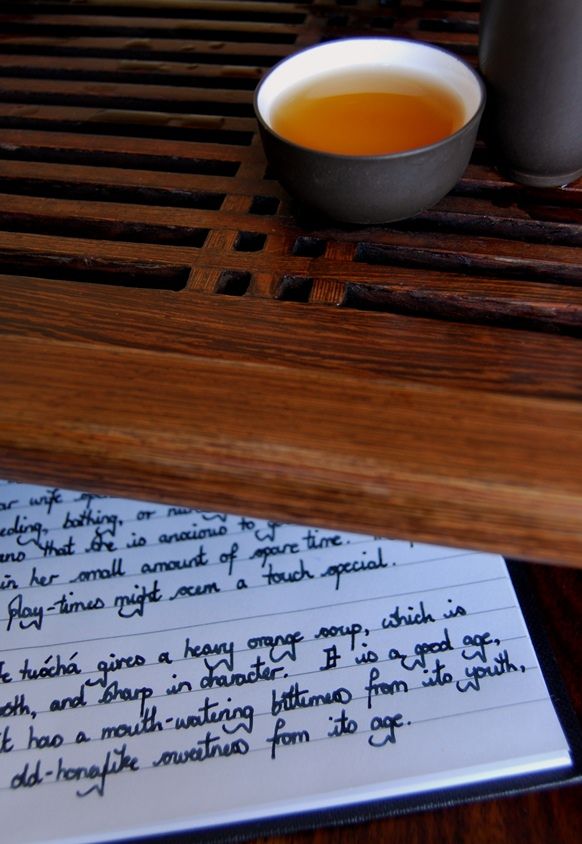Long-time readers of this humble site may recall my affections for the 1998 Menghai "Kongque", a charming old tuocha that I bought for a pittance at Yunnan Sourcing, ages ago. I had little disposable income at the time, because I was spending half of each week travelling to see my new girlfriend, a very pretty Chinese lady whom I'd just met at a conference, and who was clearly way out of my league.
With little money to spare, every purchase counted, and I treasured every tea that came my way. Such careful buying is a healthy state to cultivate, and I try to hold onto the buying habits of my previous self.
Imagine my delight, then, when my Singaporean teachum, the extraordinarily generous Keng, sent me this 2004 version from the same series. "Kongque" [approximately, kong-ch'ooer] is the Zhonglish name for a peacock. It has long been one of the highest-grade tuocha productions from one of my favourite factories, the eternally-mighty Menghai.
The little red ribbon that has been pressed into the leaves is Menghai's subtle way of saying "aww yeah". I imagine an elderly, experienced Menghai blender pronouncing that phrase in a Chinese accent, and it pleases me.
You may be able to tell from the images that this is much larger than my original, beloved 1998 Kongque, weighing in at 250g instead of 100g. I prefer the larger size - of course, they last longer, but they also have more of a critical mass from which to develop a healthy maturity.
Unlike the crushed melange of Xiaguan tuocha, this is a mostly whole-leaf affair, made from tiddly little tip-leaves. The colour is already turning a rusty orange, and I am reminded that Singaporean storage seems to be intensely successful.
Hallelujah: it has the sweet, bookish aroma of shicang [wet store]. I am in seventh heaven, and water has yet to hit the leaves.
The soup is heavy orange, which is clean, smooth and sharp in character. It is a good age, because it has a mouth-watering bitterness from its youth, and an old-honeylike sweetness from its age.
The shicang aroma is much less obvious when brewed, and I suspect that any shicang has occurred prior to its migration to Singapore, where it has probably received a drier treatment. It is pinewood, sharp, and highly enjoyable - just as one would expect from one of Menghai's better productions.
Kongque will always have a special place in my heart.
Addendum
February, 2013
This big tuocha has hot and humid darkness - sweet, long, and most satisfying. It has an "incompressible" body, filled with hot straw and sweetness. The kuwei is solid, which challenges and provides continued interest.





8 comments:
appreciate the peek in your diary...
eternally and manic curiousity...
--shah8
I'm curious now about the red ribbon. I recently sampled a couple of Tong Qing cakes that each had that same ribbon in them. Is Tong Qing a Menghai factory production?
Dear Shah,
I guarantee you would be poorly rewarded for any time invested in reading my diary. :)
Dear Radishes,
I don't believe that there's any link between Tongqing / Tongqinghao and Menghai, but you never know, given the reach of the Menghai diaspora!
The red ribbon is used by Menghai as a traditional marker of supposed quality, but I imagine that it's not unique to them. The original Tongqinghao is an ancient type of pu'ercha, so maybe they originated the use of ribbons, and Menghai used it. Alternatively, perhaps Menghai picked up the idea from somewhere, and, if Tongqinghao are a recent reinvention re-using the classical name, then I imagine that they just copied it from Menghai.
Or perhaps it came from smoewhere else entirely - I've not seen it in anything apart from Menghai tea, for what it's worth. :)
Toodlepip,
Hobbes
Reading this post, I checked up on the remaining chunk of the '98 kongque tuo you so graciously gifted to me several years ago. About 4 more tea sessions worth remain. Not going to drink it during a work day, though. It's a special occasion tea.
I'm glad the little fellow is still going strong, Carla. :)
Toodlepip,
Hobbes
Excellent response, dear Hobbes. You can always be counted on for great information. Thank you :)
Sampled the 90s Menghai Dayi Tuocha with a red ribbon as well at the 9th Southeast Asia Puer Tea Trade fair in Malaysia recently. This exceptionally tasting aged collection 90s Tuocha was courtesy of Skip4tea.
Color of liquor - Red and clean
Astringency - None
Smokiness - None
Dryness (mouth) - None
Hui gan (回甘) - Long and strong
Flavor / body - First few brews with fragrance of dayi and sweetness of dates, exceptionally mellow and full body; 7th brew onward with continuous sweetness upto some 18 brews before tapering off. 忘不了...忘不了... was in the minds of everyone as the taste lingers in the mouth even after a few hours.
Overall value - Excellent for such rare collection but unfortunately after some members managed to grab only a few pieces, they were kept away from sale..
https://www.facebook.com/groups/318943964784529/permalink/714069581938630/
Fantastic - thank you very much, James.
Toodlepip,
Hobbes
Post a Comment